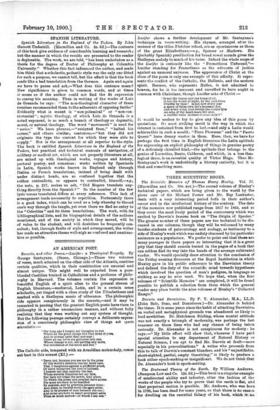AN AMERICAN POET.
Sonnets, and other Poems.—Lucifer : a Theological Tragedy. By George Santayana. (Stone, Chicago.)—These two volumes of verse, much admired on the other side of the Atlantic, combine certain qualities, which in their combination are unusual and almost unique. This might well be expected from a pure. blooded Castilian trained in Catholicism and a professor of philo- sophy in Harvard. The volumes contain the expression in beautiful English of a spirit alien to the general stream of English literature,—mediseval, Latin, and in a certain sense scholastic, yet tinged with a close study of the Elizabethans and marked with a Shelleyan music of utterance. The philosophic side appears conspicuously in the sonnets,—and it may be remarked in passing that the greatest English poets have risen to philosophy in a rather unconscious manner, and without fully realising that they were working out any system of thought. But the following passage certainly conveys a deliberate expres- sion of a consciously philosophic view of things sat, specie eternitatis:— "For long ago I taught my thoughts to run Where all the great things live that lived of yore, And in eternal quiet float and soar
There all my loves are gathered into one, Where change is not, nor parting any more, Nor revolution of the moon and sun."
The Catholic side, tempered with an Arnoldian melancholy, comes out best in this sonnet (XI.) :—
"Deem not, because you see me In the press Of this world's children run my fated race, That I blaspheme against a proffered grace, Or leave unlearned the love of holiness. I honour not that sanctity the less,
Whose aureole illumines not my face, But dare not tread the secret, holy place, To which the priest and prophet have access. For some are born to be beatified
By anguish. and by grievous penance done ; And some, to furnish forth theme's pride, And to be praised of men beneath the sun And some are born to stand perplexed aside From so much sorrow—of whom I am one." Lucifer shows a further development of Mr. Santayana'a technique in verse-writing. His rhymes, arranged after the manner of the Giles Fletcher school, are as spontaneous as those of the great Elizabethans,--e.g., Spenser or Marlowe. His (probably Spanish) predilection for broad vowel sounds gives the Shelleyan melody to much of his verse. Indeed the whole scope of the Lucifer is curiously like the "Prometheus Unbound,"— Lucifer standing for Prometheus as the advocate of justice against an unmoral universe. The appearance of Christ at the close of the poem is only one example of this affinity. It repre- sents the conflict of the Catholic, the Hellenic, and the modern spirit. Hermes, who represents Hellas, is not admitted to heaven, for he is too innocent and unruffled to have aught in common with Christians, though Lucifer asks of Christ :— " Is not thy bosom still the home of all, Is not the womb of night, by thy rays riven Fruitful by thee ? Is not now every star A spark of thine own Life's incessant fire, And every wind, that sweeps the cosmic lyre An echo of thy heart-beats felt afar, A needful voice In thine eternal choir 5"
It would be useless to try to give any idea of this poem by quotations. Its most striking merit is the way in which the interest is sustained from first to last,—and only a Latin would achieve this in such a mould ; "Piers Plowman" and the "Faerie Queen" have dreary wastes in them. Here, then, we have for perhaps the first time in English literature the Latin aptitude for expressing an explicit philosophy of things in genuine poetry of a delicately chiselled kind,—the aptitude that belongs to the genius of Lucretius, Dante, Calderon, and which, in a less thee logical dress, is an essential quality of Victor Hugo. Thus Mr. Santayaua's work is undoubtedly a literary curiosity, but it is that and something more.


































 Previous page
Previous page